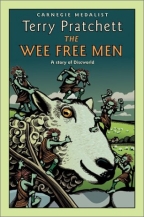The Wee Free Men
Terry Pratchett
Harper Collins
US Hardcover First
ISBN 0-060-01236-6
Publication Date: 04-29-2003
272 Pages; $16.99
Date Reviewed: 09-29-03
Reviewed by: Rick Kleffel © 2003

REFERENCES
COLUMNS
|
|
|
The Wee Free MenTerry PratchettHarper CollinsUS Hardcover FirstISBN 0-060-01236-6Publication Date: 04-29-2003272 Pages; $16.99Date Reviewed: 09-29-03Reviewed by: Rick Kleffel © 2003 |
|
|
REFERENCES |
COLUMNS |
One of the reasons that the world of young adult fiction is so widely enjoyed and wildly popular is that writers often benefit from the restrictions imposed by the genre. Freed from the necessity of spurious sex scenes, liberated from the requirement of rote violence, writers can concentrate on the language and characters. Terry Pratchett has less need of these freedoms than other writers. His work is already liberated from the droll necessities. The result is that when he writes a young adult Discworld novel, it seems pretty much like the rest of his oeuvre. But even Pratchett benefits from a string or two. In 'The Wee Free Men' his second YA title, the language seems finer, the characters more detailed, the prose almost elegiac. The openly silly aspects of Discworld are dialed down into the background. Am I really talking about a Terry Pratchett novel? As it happens, 'The Wee Free Men' could easily change what you think of as "a Terry Pratchett novel." Apparently, we're all going to look back and be utterly amazed that the we were having quite a lot of fun reading what turns out to be great literature.
When Tiffany Aching takes her obnoxious little brother Wentworth to the river, she meets some very small men and a rather larger green monster. As it happens this is only the precursor to a full-blown invasion of the Chalk. Tiffany will have to use her wits to save her not only her brother but her world. Fortunately Tiffany is supplied with the perfect proportion of wit and persistence. She's determined to get to the bottom of what's going on and do something about it herself.
'The Wee Free Men' is every bit as engaging as Pratchett's "adult" Discworld novels and something else besides. There's a tone of distant sadness that plays behind Tiffany's discovery of her true nature. The enjoyable silliness of the Mac Nac Feegle, the free men of the title, turns on some of the cleverest linguistic tricks you're likely to find anywhere. Some of these tricks may be a bit beyond the intended audience; the Scottish brogue that informs their speech may be a bit more confusing to young American audiences than it will be to young British readers. But it's no less funny, and to be honest, Pratchett's adult fans will probably comprise the majority of the audience for this book.
But children who read the book, and girls in particular will not be disappointed. Those who managed to get their kids to read Neil Gaiman's 'Coraline' should find that their children will enjoy 'The Wee Free Men' as well. Pratchett manages the neat trick of making vocabulary lessons enjoyable. Yes, Pratchett's writing a "girl power" novel. But he doesn't condescend to his younger audience. In some ways he gives them more credit than the "regular" Discworld readers. He spends more than a little time effectively speaking to the sadness that goes hand-in-hand with being a child. The result is lyrical, powerful prose that'll surprise the heck out of the odd literati who might pick up this novel. The rest of us will simply extend our grins even wider.
One does well to remember the science fiction roots of Discworld novels, which give them a sort of solidity that often seems lacking both in adult fantasy and children's fiction. Here that cohesiveness goes to the creation of an antagonist that is both deadly and very imaginative. Most importantly, the antagonist is consistent. Pratchett's magic is sufficiently advanced to strike one as simply technology. As Tiffany learns the ropes, her ability to manipulate the logical structures that are being used to invade her world gives her hope of defeating the enemy.
Pratchett is most effective when speaking of the relationship between Tiffany and her Grandmother Aching. He eloquently evokes the bond between grandparents and their grandchildren without suffocation. There's a real hard-headedness that cuts through the novel. It gives the humor the spine it needs to be funny and the emotions the weight they need to carry. Pratchett eschews simple decisions and happy endings for complex reactions that bring his fantasy a sense of real life.
This is not to say that 'The Wee Free Men' isn't laugh-out-loud funny. The Mac Nac Feegle are a wonderful linguistic invention. Even the most stolidly American reader is going to be hearing their pseudo-Scottish brogue for days after reading the novel. The puns aren't absent, but they have been taken on a stealthy new power that makes them all the funnier.
Fans of Pratchett will find that the specifics of Discworld have moved into the background in 'The Wee Free Men'. With a little twiddling, this novel could be set in some chalky, remote village of our world. That may make the novel a bit more accessible to those who are just wading into the Discworld series. The real treat of 'The Wee Free Men' is that anybody can pick it up and have a great time reading what proves to be great literature.